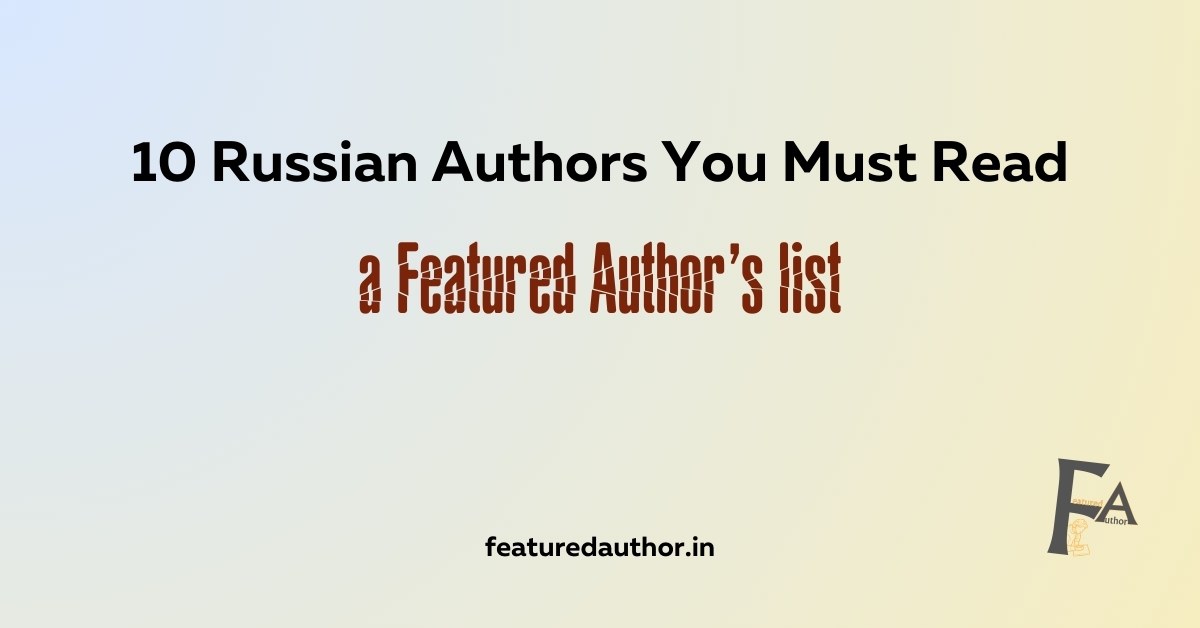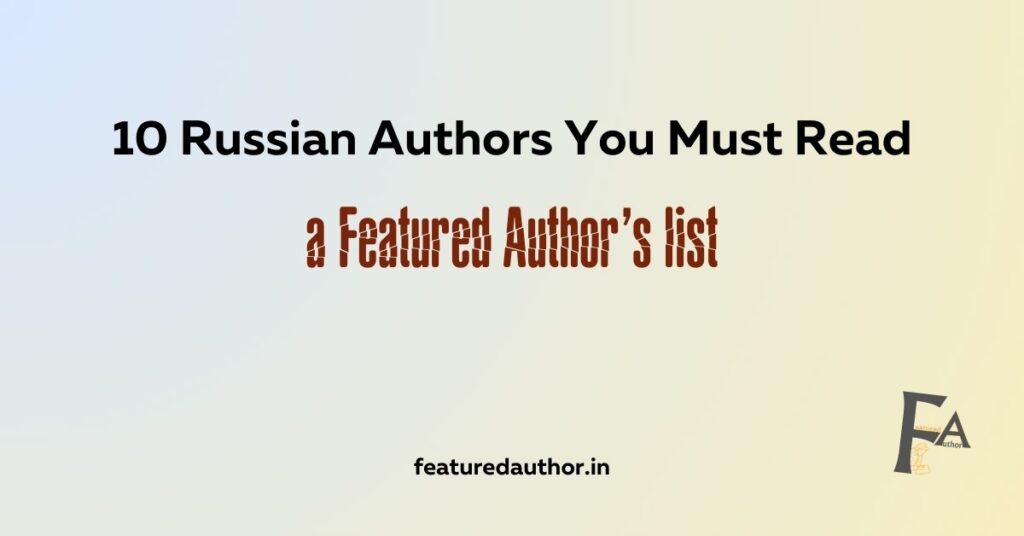Tags: #20th Century#RussiansNovelists
In the Indian context, the term Russian has wrongly been subjected to notoriety! I do not want to get into that abyss. However, for those who love reading, the term Russian connotes a distinguished world of narratives, characters, stories, and tales that have shaped the world of literature for centuries. Indeed, Russian literature has long been a treasure trove of profound human insight, intense emotions, and intricate narratives that have left an indelible mark on world literature. From the icy plains of Siberia to the bustling streets of St. Petersburg, Russian authors have mastered the art of storytelling, weaving philosophical inquiry with vivid depictions of the human condition. For today’s readers, delving into Russian literature is like stepping into a parallel world that challenges, captivates, and enriches equally.
(PS: Now that a tall Uncle Sam is at the helm of happenings, I believe Russia and Ukraine sit together and sort it out rather than stand and fight it out.)
What Distinguishes Russian Authors?
Russian writers are renowned for their unparalleled ability to explore existential themes with depth and precision. While literature from other traditions often grapples with the individual, Russian authors frequently tackle universal human questions, examining morality, freedom, suffering, and redemption on a grand scale. Their narratives are often layered with cultural, political, and philosophical commentary, making them timeless and thought-provoking.
Stylistically, Russian authors exhibit a remarkable balance between realism and symbolism. They often capture life’s minutiae with meticulous detail while infusing their works with allegorical and metaphysical elements. Whether it’s Dostoevsky’s intense psychological probing or Tolstoy’s panoramic depictions of society, Russian literature consistently marries intellectual depth with narrative brilliance.
Why Read Russian Literature?
Reading a Russian author is not just a literary experience—it’s an intellectual adventure. Russian authors take readers through the labyrinth of human emotions, relationships, and dilemmas. Their works compel introspection and offer fresh perspectives on life’s complexities. Moreover, their unique storytelling style, rich cultural backdrop, and universal themes make Russian novels resonate across time and geography. As soon as you read a few chapters from any work by a notable author, you will certainly concur with me that Russian literature offers a deep, enriching escape for those seeking a break from fleeting social media narratives. It’s like trading fast food for a gourmet meal—challenging but ultimately rewarding.

10 Best Russian Authors of All Time
1. Leo Tolstoy (1828–1910)
Best Works: War and Peace, Anna Karenina, The Death of Ivan Ilyich
Leo Tolstoy is synonymous with Russian literature, and for good reason. His magnum opus, War and Peace, is a sweeping historical epic that interweaves the fates of multiple characters against the backdrop of the Napoleonic Wars. Meanwhile, Anna Karenina explores themes of love, fidelity, and societal expectations with unparalleled emotional depth. Tolstoy’s realism and psychological insight make his works timeless. His meticulous attention to detail immerses readers in his characters’ lives, making their joys and sorrows profoundly relatable. Tolstoy’s exploration of moral and spiritual dilemmas adds layers of complexity, challenging readers to reflect on their values. Reading Tolstoy is an invitation to witness humanity in all its flawed and glorious facets.
2. Fyodor Dostoevsky (1821–1881)
Best Works: Crime and Punishment, The Brothers Karamazov, Notes from Underground
Dostoevsky’s works delve deep into the human psyche, exploring themes of guilt, redemption, and existential despair. Crime and Punishment follows the tormented Raskolnikov as he grapples with the moral consequences of his actions. The Brothers Karamazov is a philosophical and theological masterpiece that tackles questions of faith, free will, and justice. Dostoevsky’s characters often embody the struggles of the human condition, making his narratives both unsettling and profoundly enlightening. His ability to intertwine psychological depth with philosophical discourse makes his works a must-read for anyone seeking intellectual stimulation and emotional resonance.
3. Alexander Pushkin (1799–1837)
Best Works: Eugene Onegin, The Queen of Spades
Often hailed as the father of Russian literature, Pushkin’s influence extends far beyond his relatively short life. His novel-in-verse Eugene Onegin is a quintessential Russian classic that captures the spirit of Romanticism while critiquing societal norms. Pushkin’s mastery of language, lyrical beauty, and sharp wit make his works a delight to read. His elegant yet profound storytelling offers insights into human emotions and relationships. Pushkin’s contributions laid the foundation for the golden age of Russian literature, earning him an enduring place in the literary canon.
4. Anton Chekhov (1860–1904)
Best Works: The Cherry Orchard, The Seagull, The Lady with the Dog
Chekhov is celebrated for his short stories and plays, which capture the subtleties of human relationships with remarkable precision. His works, such as The Lady with the Dog, are renowned for their understated emotional depth and poignant realism. Chekhov’s ability to portray ordinary life with extraordinary insight is what sets him apart. His works often eschew dramatic resolutions, opting instead for quiet moments of introspection. Chekhov’s influence on modern literature and drama is immeasurable, making him a cornerstone of Russian literary heritage.
5. Vladimir Nabokov (1899–1977)
Best Works: Lolita, Pale Fire, Speak, Memory
Nabokov’s literary genius lies in his linguistic prowess and innovative narrative techniques. Lolita, though controversial, is a masterclass in unreliable narration and poetic prose. His autobiographical work Speak, Memory is a testament to his ability to blend memoir with artistry. Nabokov’s works challenge readers to appreciate the nuances of language and the complexity of storytelling. His playful yet profound approach to literature ensures that his novels remain captivating and thought-provoking.
6. Ivan Turgenev (1818–1883)
Best Works: Fathers and Sons, A Month in the Country
Turgenev’s Fathers and Sons is a seminal work that captures the generational tensions and ideological shifts of 19th-century Russia. His poetic prose and nuanced characterisation make his works deeply engaging. Turgenev’s ability to blend personal and political themes ensures that his novels resonate across generations. His exploration of human emotions and societal change makes his works timeless and relatable.
7. Nikolai Gogol (1809–1852)
Best Works: Dead Souls, The Overcoat, The Nose
Gogol’s satirical works expose the absurdities of Russian society with humour and pathos. Dead Souls is a biting critique of bureaucracy and greed, while The Overcoat captures the plight of the downtrodden with heartbreaking clarity. Gogol’s surrealistic style and sharp social commentary make his works a fascinating blend of the comic and the tragic. His influence on Russian and world literature profoundly inspires generations of writers.
8. Mikhail Bulgakov (1891–1940)
Best Works: The Master and Margarita, Heart of a Dog
Bulgakov’s The Master and Margarita is a dazzling fusion of fantasy, satire, and philosophical inquiry. The novel’s parallel narratives, one set in Stalinist Moscow and the other in biblical Jerusalem create a rich tapestry of themes. Bulgakov’s imaginative storytelling and fearless critique of authoritarianism make his works entertaining and thought-provoking. His ability to intertwine the fantastical with the profound ensures his lasting relevance.
9. Boris Pasternak (1890–1960)
Best Works: Doctor Zhivago
Pasternak’s Doctor Zhivago is a sweeping epic that captures the turmoil of revolutionary Russia through the eyes of its poetic protagonist. The novel’s lyrical prose and philosophical depth make it a masterpiece of 20th-century literature. Pasternak’s ability to convey profound emotional and historical truths through vivid imagery and poetic language makes his works an enduring testament to human resilience and creativity.
10. Maxim Gorky (1868–1936)
Best Works: Mother, The Lower Depths
Gorky’s works, such as Mother, are celebrated for their powerful portrayal of social and political struggles. His realism and commitment to social justice resonate deeply with readers. Gorky’s influence on Russian literature and his role in shaping the Soviet literary tradition makes him a pivotal figure. His works continue to inspire readers to reflect on equality and human dignity issues.
So, are you ready?
Embarking through Russian literature is like stepping into a world of unparalleled depth and complexity. These 10 authors have crafted narratives that transcend time and place, offering insights into the human condition that remain profoundly relevant. Whether you’re seeking intellectual challenge, emotional catharsis, or sheer storytelling brilliance, Russian literature promises an unforgettable experience. So, are you ready to immerse yourself in this rich literary tradition? Let these titans of Russian literature be your guides.
Ashish for Featured Author
